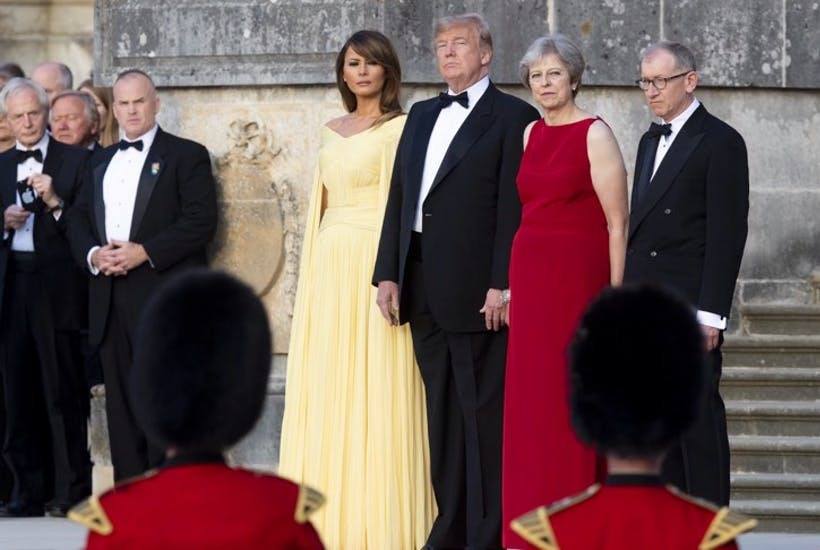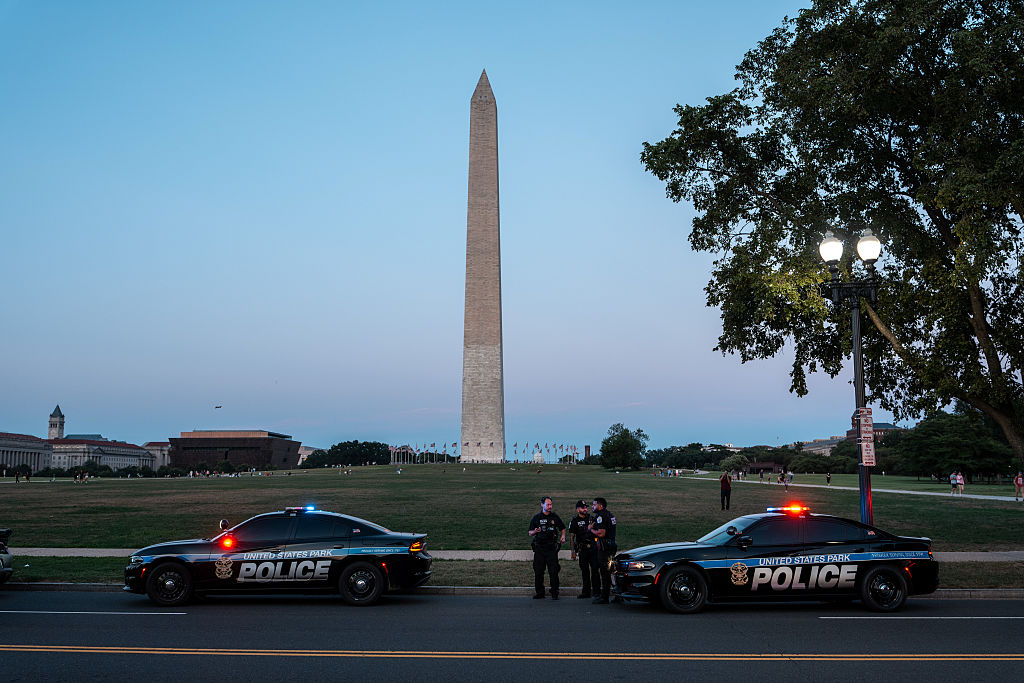“Never call a state visit a success until the visitor has left the country’s air space” is a good rule of prudence for both politicians and journalists. And that goes double when the head of state doing the visiting is President Trump. He is still on British soil as I write, but even if I knew what he will say or do in his remaining time here, I still couldn’t predict the likely public reaction. After all, he arrived to the background music of a Sun interview in which he had denounced Theresa May’s Brexit policy and suggested that Boris Johnson — since Monday her main political adversary on the Right — would make an excellent prime minister. All that was missing was “Vive l’Angleterre Libre.”
But instead of coldly instructing him to return home as Canada had instructed de Gaulle in 1967, Theresa May shrugged off the matter, accepted his plainly false assurances that the Sun interview was a case of fake news, and joined him at a press conference in which he lavished praise on her — “a tough negotiator . . . very, very smart and determined person … I would much rather have her as my friend than my enemy.”
Skeptics noticed that at other points in press conference, Trump repeated in a minor key some of his louder trumpet-blasts in the Sun. Yes, he had given advice — well, suggestions — to May on how to conduct negotiations with the EU and he understood that these suggestions were “brutal” and “tough” to follow. But some day “she might very well do what I suggested.” As for Boris, he was a great guy and he was doing a wonderful job, and so, by the way, was Theresa May, and he himself was no slouch. All of which was carried off with dash and brio, and the crowd except for the CNN and NBC honchos left smiling.
But wasn’t this a diplomatic repair job for a grotesque breach of good manners from a head of state to his host? Sure, the firm official blind eye was one aspect of the day’s entertainment, not be confused with policy. But what of the anti-Trump demo in London involving about 100,000 ordinary people? It isn’t exactly news that quite a lot of London lefties hate Trump, the USA, Theresa May, the Tories, and the right-wing of the Labour party, not necessarily in that order. But Trump was around, and it was a nice day for a demo. What was more surprising was a national poll showing there was a clear majority of Brits who wanted Trump to visit and who disapproved of the demo. Why that was so is worth unpacking.
One obvious reason is the commonsense of people not intoxicated with radical political ideas. As several comments on the internet pointed out: hey, you might not agree with Trump, but he’s the president of our greatest ally and political friend.
And he seems to like us too, which is more than you can say for that bunch of dessicated bureaucrats warming their bottoms on the Brussels gravy train across the Channel who actually say they want to harm and humiliate us. But it goes somewhat deeper than that. Ever since the Second World War, the British working class has been significantly more pro-American than other classes. Working with Americans, ordinary soldiers got the impression their kind had a fairer shake of the stick than at home. That preference was obscured by the fact that their party, Labour, was also the largest home of political anti-Americanism in the Cold War. Labour leaders like Jim Callaghan kept the Jeremy Corbyns of his day firmly battened down below the hatches. But Corbyn now runs the show precisely because old partisan allegiances are fading, and the workers are now “in play” politically.
Insofar as new social-cum-political divisions are emerging, they are between Remainers and Leavers. Polls and elections both suggest that on this spectrum the workers are for Brexit.
So are some more traditional Tory groups such as the political allies of the armed forces. Both tend to be more patriotic, more defense-minded, more attached to countries like Australia and Canada (whither Brits tend to migrate), and more aware of the usefulness of ties to the US via the Anglo-American special relationship.
Consider, now, the two actual issues on which Trump’s visit to the UK visit has revolved: defense and trade (or, more specially, a US-UK free trade area.) Both of them are significant for the special relationship which, since it is eternally controversial, needs a brief explanation at this point. (I have a longer one in last year’s National Review.) Like Gaul, it can be divided into three parts:
1. It rests on a deep and unique infrastructure of cooperation between the two governments at all levels: military, diplomatic, intelligence, and (top) political, seen in such things as the high level of inter-operability between U.K. and U.S. forces, the Five Eyes electronic intelligence-gathering alliance, etc., etc.
2. It works because it grows in the cultural soil of the Anglosphere. Decision-makers in all its countries tend to see the world in the same way. Compared with other powers, Germany say, Anglosphere governments exhibit a kind of muscular liberalism in international relations.
3. It’s worldwide. Unlike other US alliances, even NATO, it is global in scope, originally as an alliance against Communism, today against a variety of threats, including jihadist terrorism.
To avoid needless controversy, let me concede at once that it hasn’t always worked to the advantage of both sides. Europeanists in the UK see it as an obstacle to Britain’s inevitable European destiny; and some Brits resent Suez, Reagan’s Grenada intervention, and occasional slights liked the alleged removal of Churchill’s bust from the Oval Office by Obama. My advice to the first group is to read Keynes: “The unexpected always happens, the inevitable never.” That should be a relief to them. To my compatriots: Grow up. If you’re the best friend of the football hero, most times he’ll get the best girl. But you’ll get more of them than otherwise.
What should settle the question of the usefulness of the SR is the fact that of all Britain’s postwar prime ministers until now, only Ted Heath was seriously hostile to it. Attlee, Churchill, Eden, Macmillan, Douglas-Home, Wilson, Callaghan, Thatcher, Major, Blair, Brown, and Cameron all ended up being its practical enthusiasts. That doesn’t settle the question entirely, but it’s a strong indicator — Heath was a disaster.
What of Mrs. May? She doesn’t seem to be an instinctive supporter of Global Britain either in defense or trade. Her government has penny-pinched the armed forces to the point where General Mattis sent over a letter complaining regretfully that Britain was ceasing to be a useful ally. She was quoted, apparently accurately, as doubting whether Britain should want a world role. And though this aspect of the Brexit negotiations has escaped the notice of most politicians except for the former Foreign Secretary, Lord (David) Owen, she is committing the UK to the deep role in the EU defense structures that until now every British government has opposed.
It was interesting, therefore, that on the eve of Trump’s arrival for the NATO meeting, a stellar group of top spooks and military brass hats in Veterans for Britain sent her a letter, reported in The Times, admitting frankly that Trump was right about the failure of NATO members to spend enough and adding, to the UK’s embarrassment that Mattis was right too—and that Britain’s military was the disastrously short of equipment across the board.
Unfortunately, that letter did not have the shock effect it merited. It was rather a case of déjà vu all over again. More surprising was the decision to let the news dribble out that May’s Chequer’s proposal for Brexit—or non-Brexit if you wish—contains provisions on trade policy that would make a free trade deal with the US probably impossible and certainly unappealing. That was surprising because when May visited Washington last year, she seemed enthusiastic about a US-UK trade deal on the particular grounds that it would be a giant step towards, as I then wrote, “a successful Brexit—and a post-Brexit grand strategy for Global Britain.”
On both trade and defense, therefore, Trump between the jokes was saying things with which many Brits agree, in particular conservative-minded and patriotic Brits, and which Mrs May no longer seems to favor. Her policy seems to be Ted Heath Mark Two — Out goes the special relationship, In comes the brotherhood of Brussels.
It’s not surprising that many Brits welcomed Trump. He may not be the best possible representative of Uncle Sam, but we’ll miss him when he’s gone. Uncle Sam too.

























